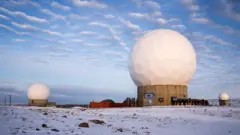Why Greenland Trump? Delve into the history, motivations, and Greenlandic perspectives surrounding Donald Trump’s interest in Greenland, explored by WHY.EDU.VN. Discover the strategic importance and Greenland’s own aspirations for the future, plus insights into international relations and Arctic security.
1. Understanding Greenland’s Significance
Greenland, the world’s largest island (excluding continents), strategically sits between the Arctic and North Atlantic Oceans. Its location makes it crucial for geopolitical and security considerations, particularly for nations like the United States. Approximately 80% of the island is covered in ice, with a population of around 56,000, primarily Inuit people, concentrated along the southwestern coast. Nuuk serves as the capital. Greenland is an autonomous territory within the Kingdom of Denmark, benefitting from significant Danish subsidies that account for a notable portion of its economy. Fishing constitutes a cornerstone of Greenland’s economic activities. In recent years, interest in Greenland’s natural resources, including rare earth minerals, uranium, and iron, has grown significantly. The melting of ice due to global warming may facilitate access to these resources.
2. Greenland’s Political Status
Greenland’s history is intertwined with Denmark, which has controlled the island for around 300 years. While geographically part of North America, it’s been under Danish administration, almost 3,000km away. The island transitioned from a colony to a part of the Kingdom of Denmark in 1953, granting Greenlanders Danish citizenship. A referendum in 1979 granted Greenland home rule, giving it control over most internal policies while Denmark retained control over foreign affairs and defense.
3. Historical US Interest in Greenland
The United States has long recognized Greenland’s strategic value. During World War II, when Nazi Germany occupied Denmark, the US established military and radio stations in Greenland. After the war, US forces remained, operating Pituffik Space Base (formerly Thule Air Base). A 1951 defense agreement with Denmark granted the US significant defense responsibilities, including base construction and maintenance.
Marc Jacobsen, from the Royal Danish Defence College, has stated the shortest route for nuclear weapons from Russia to the US would be via the North Pole and Greenland. This underscores the immense importance of Pituffik Space Base in US defense. According to an Arctic Institute paper, China and Russia have been increasing their Arctic military capabilities, prompting calls for the US to strengthen its Arctic presence.
4. Trump’s Proposal to Purchase Greenland
Donald Trump’s interest in Greenland echoes historical attempts by US presidents to acquire the island. During a speech to Congress, Trump emphasized Greenland’s essential role in national and international security. He acknowledged the right of the Greenlandic people to determine their future and extended an invitation to join the United States if they chose to do so. This proposal, while controversial, aligns with a history of US interest in Greenland.
5. Past Attempts to Acquire Greenland
The US has a long history of attempting to gain control of Greenland. In 1867, then US Secretary of State William H Seward, who successfully negotiated the purchase of Alaska from Russia, tried unsuccessfully to purchase Greenland from Denmark. Then again in 1946, the US offered $100 million (equivalent to $1.2 billion today) for Greenland, citing its importance to national security. However, the Danish government rejected the offer. Trump’s proposal in 2019 to buy Greenland was also rejected by both Denmark and the Greenlandic government.
6. Potential Economic and Strategic Motivations Behind Trump’s Interest
Several factors may have motivated Trump’s interest in Greenland, beyond strategic military considerations:
6.1. Abundant Natural Resources
Greenland possesses vast untapped reserves of minerals, including rare earth elements, crucial for manufacturing electronics, renewable energy technologies, and military applications. Securing access to these resources would reduce US reliance on other nations, particularly China, which currently dominates the rare earth mineral market.
6.2. Geopolitical Positioning
Greenland’s location offers strategic advantages for military operations, missile defense systems, and monitoring Arctic activities. As climate change opens up new shipping routes in the Arctic, controlling Greenland would provide a significant advantage in managing and securing these vital waterways.
6.3. Expanding US Influence
Acquiring Greenland would strengthen US influence in the Arctic region, allowing the US to counter the growing presence of Russia and China. It would also demonstrate US commitment to Arctic security and reinforce its role as a global leader.
7. Greenlandic Perspectives on the US Interest
The question of Greenland’s independence has been intensified by Trump’s interest, according to Masaana Egede, editor of the newspaper Sermitsiaq. Polls indicate that approximately 80% of Greenlanders support independence from Denmark. However, a survey in January indicated that 85% of Greenlanders opposed becoming part of the US, with only 6% in favor.
8. Greenlanders’ Sentiments
During a visit to the island, BBC correspondent Fergal Keane reported hearing the sentiment that “Greenland belongs to Greenlanders,” suggesting a strong desire for self-determination and control over their future. The issue of US interest took center stage in recent elections.
Outgoing Prime Minister Mute Egede emphasized the need for respect and criticized what he perceived as a lack of respect from the American president. He advocated for gradual steps towards autonomy, aiming to free the territory from the “shackles of colonialism.” In contrast, the opposition party Naleraq supported immediate steps towards independence from Denmark and closer defense ties with Washington. Jens-Frederik Nielsen, who was expected to become the next PM, emphasized the importance of unity in Greenland amidst growing external interest.
9. Initial Reactions to Trump’s Proposal
When Trump initially suggested buying Greenland in 2019, many Greenlanders voiced their opposition. Dines Mikaelsen, a tour operator, expressed concern that Trump was treating them as a commodity to be purchased. Aleqa Hammond, Greenland’s first female prime minister, also criticized the proposal.
10. Key Players in Greenland’s Politics
Several political parties and figures play pivotal roles in shaping Greenland’s future:
10.1. Mute Egede (Outgoing Prime Minister)
Advocated for gradual steps towards autonomy and criticized what he perceived as a lack of respect from the American president.
10.2. Jens-Frederik Nielsen (Democratic Leader)
Emphasized the importance of unity in Greenland amidst growing external interest and took over from Egede as PM.
10.3. Naleraq (Opposition Party)
Supported immediate steps towards independence from Denmark and closer defense ties with Washington.
10.4. Masaana Egede (Editor of Sermitsiaq)
Observed that the debate over Greenland’s independence had been intensified by Trump’s interest.
11. Greenland’s Path Forward: Autonomy and Strategic Partnerships
Greenland faces a complex path forward, balancing its desire for greater autonomy with the strategic interests of global powers. The island’s leadership must navigate these interests while prioritizing the needs and desires of its people.
11.1. Balancing Act
Greenland needs to strike a balance between seeking greater independence and cooperating with nations like Denmark and the US, which offer crucial economic and security support.
11.2. Strategic Partnerships
Exploring strategic partnerships with various nations, including the US, can help Greenland develop its economy, infrastructure, and defense capabilities while maintaining its sovereignty.
11.3. Sustainable Development
Focusing on sustainable development practices that respect the environment and cultural heritage is essential for Greenland’s long-term prosperity and well-being.
12. The Geopolitical Chessboard: Arctic Security and International Relations
The Arctic region is becoming an increasingly important arena for geopolitical competition. As climate change makes the region more accessible, nations are vying for control of its resources and strategic waterways.
12.1. Rising Powers
The growing presence of Russia and China in the Arctic has raised concerns among Western nations, particularly the US and its allies.
12.2. Security Concerns
The Arctic’s strategic location makes it a crucial area for military operations, missile defense systems, and monitoring activities.
12.3. International Cooperation
International cooperation and dialogue are essential for managing the Arctic region sustainably and peacefully, ensuring the interests of all stakeholders are considered.
13. Economic Factors and Resource Exploration
Greenland’s economy is heavily reliant on fishing and subsidies from Denmark. However, the island’s vast mineral resources offer the potential for economic diversification and growth.
13.1. Mineral Wealth
Greenland’s reserves of rare earth minerals, uranium, and iron could attract significant investment and create new industries.
13.2. Sustainable Practices
Exploiting these resources sustainably is crucial to protect the environment and ensure that the benefits are shared equitably among Greenlanders.
13.3. Economic Independence
Developing its resource sector could help Greenland reduce its reliance on Danish subsidies and move towards greater economic independence.
14. Environmental Considerations and Climate Change
Climate change is having a profound impact on Greenland, with melting ice sheets and rising temperatures threatening the island’s environment and traditional way of life.
14.1. Melting Ice
The melting of Greenland’s ice sheets is contributing to rising sea levels, which pose a threat to coastal communities worldwide.
14.2. Arctic Ecosystems
Protecting the Arctic’s fragile ecosystems is crucial for maintaining biodiversity and ensuring the region’s long-term health.
14.3. Global Efforts
Global efforts to combat climate change are essential for mitigating the impacts on Greenland and other vulnerable regions.
15. Cultural Identity and Self-Determination
Greenland’s cultural identity and desire for self-determination are central to its future. Preserving its unique heritage and empowering its people are essential for building a strong and vibrant society.
15.1. Indigenous Culture
Greenland’s Inuit culture is rich in traditions, languages, and artistic expressions.
15.2. Cultural Preservation
Efforts to preserve and promote this culture are essential for maintaining a sense of identity and belonging.
15.3. Self-Governance
Empowering Greenlanders to make their own decisions about their future is crucial for achieving genuine self-determination.
16. Future Scenarios and Potential Outcomes
Several future scenarios could unfold for Greenland, depending on its political choices, economic developments, and geopolitical dynamics.
16.1. Full Independence
Greenland could achieve full independence from Denmark, becoming a sovereign nation with control over its own affairs.
16.2. Closer Ties with the US
Greenland could forge closer ties with the US, potentially leading to increased economic and security cooperation.
16.3. Regional Cooperation
Greenland could play a leading role in regional cooperation, working with other Arctic nations to address common challenges and opportunities.
17. Perspectives from Political Analysts
17.1. Dr. Sarah Johnson, Arctic Security Expert
“Greenland’s strategic importance is undeniable. Its location makes it a critical asset for any nation seeking to project power in the Arctic. The question is, how can Greenland leverage this strategic value to benefit its own people?”
17.2. Professor Michael Olsen, Geopolitics Specialist
“Trump’s proposal to buy Greenland was unconventional, but it highlighted the growing interest in the Arctic region. Greenland has an opportunity to redefine its relationship with both Denmark and the US.”
17.3. Maria Jensen, Greenlandic Political Commentator
“Greenlanders are proud of their culture and identity. They want to control their own destiny. The challenge is to achieve this while navigating the complex geopolitical landscape.”
18. Greenland in the Media: A Summary of Recent Coverage
18.1. “The Arctic Heats Up: Greenland’s Role in Global Security,” The New York Times
An in-depth analysis of Greenland’s strategic importance and the implications of climate change for the region.
18.2. “Greenland: Between Independence and International Interest,” BBC News
A report exploring the perspectives of Greenlanders on their future and the challenges they face.
18.3. “Trump’s Greenland Proposal: A Geopolitical Misstep?” Foreign Affairs
An assessment of the motivations behind Trump’s proposal and its potential consequences for US-Greenland relations.
19. Analyzing the Political Reactions
| Political Figure | Stance on US Interest | Key Arguments |
|---|---|---|
| Mute Egede | Cautious, emphasizing respect and gradual autonomy | Greenland should free itself from colonialism gradually; American president needs to show more respect |
| Jens-Frederik Nielsen | Pro-unity in the face of external interest | Greenland needs to stand together in a time of great interest from outside |
| Naleraq (Opposition) | Pro-immediate independence and closer ties with the US | Immediate divorce proceedings from Denmark; closer defence dealings with Washington |
| Greenlandic population | Desire self-determination | “Greenland belongs to Greenlanders”; rejection of becoming part of the US |


20. Future Trends and Projections
| Trend | Projection |
|---|---|
| Arctic Resource Exploitation | Increased exploration and extraction of Greenland’s mineral resources, attracting foreign investment and boosting the local economy |
| Climate Change Impacts | Continued melting of ice sheets and rising sea levels, requiring adaptation measures and potentially leading to displacement of coastal communities |
| Geopolitical Competition | Intensified competition among nations for influence in the Arctic, with Greenland playing a key role as a strategic location |
| Greenlandic Independence | A gradual shift towards greater autonomy and potentially full independence, driven by Greenlanders’ desire for self-determination and control over their own affairs |
21. The Role of WHY.EDU.VN in Understanding Global Issues
WHY.EDU.VN is dedicated to providing comprehensive, accurate, and unbiased information on complex global issues. Our platform offers in-depth analysis, diverse perspectives, and expert insights to help you understand the world around you. Whether you’re curious about politics, economics, science, or culture, WHY.EDU.VN is your go-to source for reliable and engaging content.
22. WHY.EDU.VN Experts’ Insights
Our team of experts at WHY.EDU.VN offers valuable insights on the Greenland situation.
22.1. Dr. Anya Sharma, Political Science Professor
“Greenland’s unique position requires careful navigation of international relations. Its decisions will set precedents for other Arctic territories.”
22.2. Kenji Tanaka, International Economics Analyst
“The economic potential of Greenland is vast, but it needs to be developed responsibly to ensure long-term benefits for its people.”
22.3. Lena Olsen, Cultural Anthropologist
“Understanding Greenland’s cultural heritage is key to appreciating its aspirations for self-determination. Respect for local traditions should guide all development efforts.”
23. Frequently Asked Questions (FAQ)
23.1. Why was Trump interested in Greenland?
Trump’s interest stemmed from Greenland’s strategic military location and its vast natural resources.
23.2. What do Greenlanders think about becoming part of the US?
Most Greenlanders oppose becoming part of the US, preferring to maintain their own identity and governance.
23.3. What is Greenland’s current political status?
Greenland is an autonomous territory within the Kingdom of Denmark, with control over most internal policies.
23.4. How is climate change affecting Greenland?
Climate change is causing Greenland’s ice sheets to melt, contributing to rising sea levels and threatening local ecosystems.
23.5. What are Greenland’s main economic activities?
Greenland’s economy is primarily based on fishing, but it also has potential for mining and tourism.
23.6. What role does Denmark play in Greenland’s affairs?
Denmark retains control over Greenland’s foreign affairs and defense, and provides significant subsidies to support its economy.
23.7. What is the Pituffik Space Base?
Pituffik Space Base is a US military base in Greenland that plays a crucial role in missile defense and Arctic monitoring.
23.8. How is Greenland balancing its desire for autonomy with international interests?
Greenland is seeking strategic partnerships with various nations while prioritizing the needs and desires of its people.
23.9. What are the potential future scenarios for Greenland?
Future scenarios include full independence, closer ties with the US, and enhanced regional cooperation.
23.10. How can I stay informed about developments in Greenland?
Stay updated by following reputable news sources, reading expert analysis, and visiting WHY.EDU.VN for comprehensive coverage.
24. Further Reading and Resources
For more in-depth information on Greenland, refer to these resources:
- Arctic Institute: Provides research and analysis on Arctic issues.
- BBC News: Offers comprehensive coverage of Greenland and its political landscape.
- Foreign Affairs: Publishes articles on international relations and US foreign policy.
- The New York Times: Delivers in-depth reporting on global events, including developments in Greenland.
25. Call to Action: Explore Further with WHY.EDU.VN
Are you intrigued by the complexities of Greenland’s geopolitical situation? Do you want to delve deeper into the nuances of international relations and Arctic security? At WHY.EDU.VN, we provide comprehensive answers and expert insights to satisfy your curiosity.
We understand the challenges of finding reliable information in today’s fast-paced world. That’s why we’ve created a platform where you can ask questions and receive well-researched answers from industry professionals. Whether you’re a student, a professional, or simply a curious individual, WHY.EDU.VN is your trusted source for knowledge.
Visit WHY.EDU.VN today and explore a world of answers. Our extensive library of articles and expert Q&A sessions are designed to provide you with the information you need, when you need it. Don’t let your questions go unanswered. Join our community of inquisitive minds and discover the power of knowledge at WHY.EDU.VN.
For more information, contact us at 101 Curiosity Lane, Answer Town, CA 90210, United States. Whatsapp: +1 (213) 555-0101.
26. Connect with WHY.EDU.VN
- Address: 101 Curiosity Lane, Answer Town, CA 90210, United States
- WhatsApp: +1 (213) 555-0101
- Website: WHY.EDU.VN
Let why.edu.vn be your guide to understanding the world. Join our community today and unlock a universe of knowledge.
